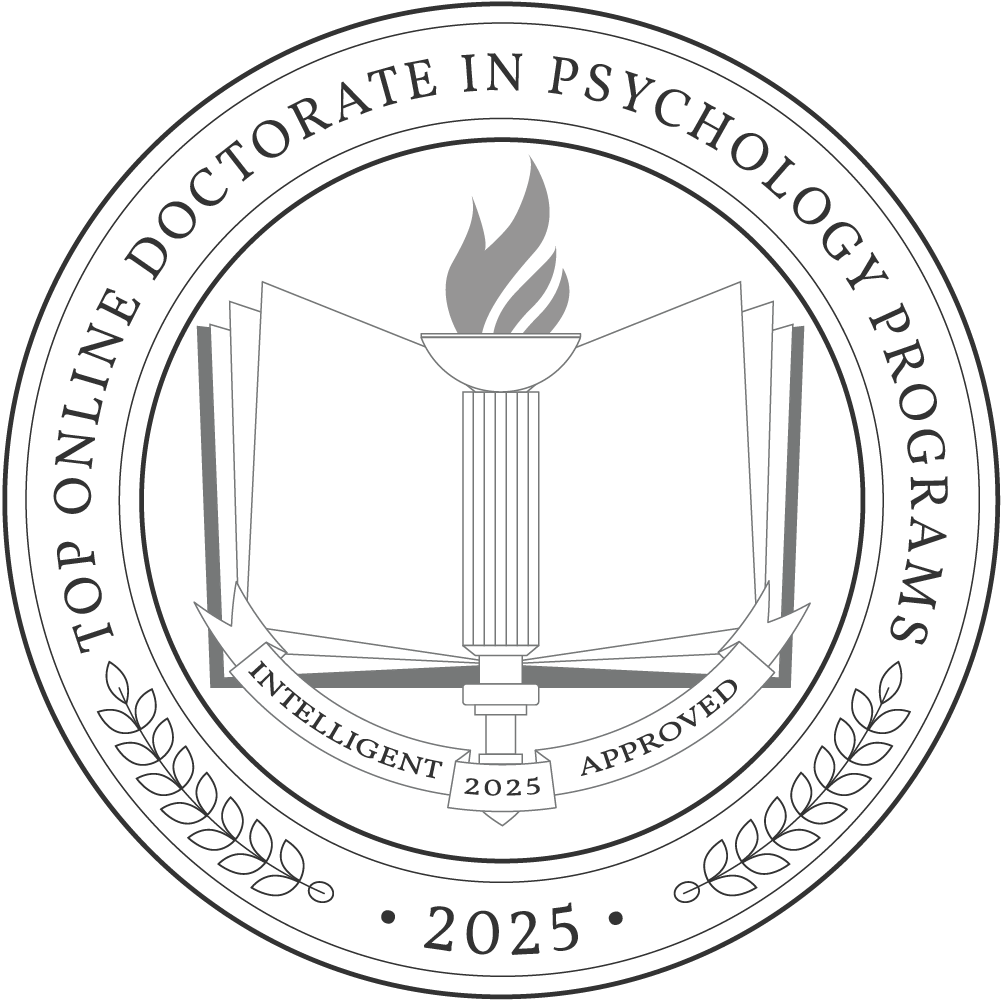For aspiring psychologists pursuing a flexible yet top-tier education, the journey to a doctorate in psychology offers endless possibilities. And those with an online doctoral degree in this field regularly earn six-figure salaries.
This article presents a curated list of the top online doctorate in psychology programs, providing a comprehensive guide to the leading institutions nationwide. We understand that choosing the right online psychology program is pivotal to your career aspirations, and our list simplifies this process by ensuring that your decision aligns with your professional goals and personal needs.
Beyond our online psychology program rankings, we delve into the degree options available, explore potential specializations, offer an updated career outlook for psychology graduates, and provide valuable tips to assist you in selecting your ideal psychology program, with insights from Blanca Villagomez, a program coordinator and counselor at UC-Irvine.
Why Trust Us
The Intelligent.com Higher Education Team is dedicated to providing students with independent, equitable school and program rankings and well-researched resources. Our expert-driven articles cover topics related to online colleges and programs, paying for school, and career outlooks. We use data from the U.S. Department of Education’s College Scorecard, the National Center for Education Statistics, and other reputable educational and professional organizations. Our academic advisory team reviews content and verifies accuracy throughout the year for the most current information. Partnerships do not influence rankings or editorial decisions.
- Analyzed over 2,000 national, accredited, and nonprofit colleges and universities
- 800+ rankings pages are reviewed and updated yearly
- Content is informed by reputable sources, surveys, and interviews with academic advisors and other experts
- Over 100 data points are reviewed for accuracy and quality throughout the year, including sources
How we rank schools
Our list features the best online Psychology degree programs at top colleges nationwide. Each school featured is a nonprofit, accredited institution — either public or private — with a high standard of academic quality for post-secondary institutions.
We evaluated each school’s program on tuition costs, admission, retention and graduation rates, faculty, reputation, and the student resources provided for online students. We collected data from trusted sources like the National Center for Education Statistics, individual school and program websites, school admissions counselors, and other data sources. Then, we calculated the Intelligent Score on a scale of 0 to 100 based on the following criterion:
Academic Quality:
- Admission rate versus enrollment rate
- Retention rate of students who return after year one
- Accreditation status (regional and programmatic)
- Nonprofit status, both private and public institutions
Graduation Rate
- Overall graduation rate
- Total number of currently enrolled students, including diversity metrics
- Student-to-faculty ratio
Cost and ROI
- In-state and out-of-state per-credit tuition rates and fees
- Required credits to graduate
- Earning potential after graduation
- Availability of federal student loans, scholarships, and other financial aid options
Student Resources
- Available student services for online-only and hybrid programs
- On-campus amenities like tutoring centers and the number of libraries
Read more about our ranking methodology.
Best 17 Online Doctorate in Psychology Programs
FiltersInstitution Type
Status
- Intelligent Score
- Alphabetically By University Name
- Acceptance Rate
- Enrollment
- In-state Graduate Tuition
- Out-of-state Graduate Tuition
- In-state Undergraduate Tuition
- Out-of-state Undergraduate Tuition

Liberty University
Intelligent Score: 99.10In-state: $14,791
Out-of-state: $14,791
In-state: $7,935
Out-of-state: $7,935
SAT: 1040-1250
ACT: 21-29
$595
Online
Southern Association of Colleges and Schools Commission on Colleges
60

Texas Tech University
Intelligent Score: 98.94In-state: $8,683
Out-of-state: $20,953
In-state: $6,788
Out-of-state: $6,788
SAT: 1070-1240
ACT: 22-27
$263
Hybrid
National Council for the Accreditation of Teacher Education
91

Touro University Worldwide
Intelligent Score: 97.78In-state: $14,400
Out-of-state: $14,400
In-state: $9,000
Out-of-state: $9,000
SAT: N/A
ACT: N/A
$700
Online
WASC Senior College and University Commission
66

Michigan State University
Intelligent Score: 97.67In-state: $15,555
Out-of-state: $40,384
In-state: $18,858
Out-of-state: $18,858
SAT: 1100-1300
ACT: 23-29
In-State: $900
Out-of-State: $1,736
Online, On-Campus
Higher Learning Commission
57

Regent University
Intelligent Score: 97.39In-state: $17,220
Out-of-state: $17,220
In-state: $15,552
Out-of-state: $15,552
SAT: 940-1220
ACT: 21-29
$800
Online
Southern Association of Colleges and Schools Commission on Colleges
61

Loyola University Chicago
Intelligent Score: 95.98In-state: $67,818
Out-of-state: $67,818
In-state: $97,480
Out-of-state: $97,480
SAT: 1190-1370
ACT: 27-32
$1,025
Online
Higher Learning Commission
72

National University
Intelligent Score: 92.69In-state: $13,320
Out-of-state: $13,320
In-state: $15,480
Out-of-state: $15,480
SAT: N/A
ACT: N/A
$1,024
Online
WASC Senior College and University Commission
60

The University of Texas at Austin
Intelligent Score: 92.12In-state: $11,448
Out-of-state: $40,032
In-state: $12,028
Out-of-state: $12,028
SAT: 1210-1470
ACT: 26-33
Resident: $405
Non-Resident: $835
Online
Southern Association of Colleges and Schools Commission on Colleges
99

California Institute of Integral Studies
Intelligent Score: 90.55In-state: $21,116
Out-of-state: $21,116
In-state: $21,116
Out-of-state: $21,116
SAT: 1010
ACT: 19
$1,537
Online
Western Association of Schools and Colleges Senior College and University Commission
36.6

Fielding Graduate University
Intelligent Score: 89.45In-state: NA
Out-of-state: NA
In-state: $20,160
Out-of-state: $20,160
SAT: 1162
ACT: 24
$989
Online
Western Association of Schools and Colleges Senior College and University Commission
79

Alaska Pacific University
Intelligent Score: 88.30In-state: $20,350
Out-of-state: $20,350
In-state: $11,700
Out-of-state: $11,700
SAT: N/A
ACT: N/A
$848
Online, On-Campus, Blended
Northwest Commission on Colleges and Universities
93

The Chicago School
Intelligent Score: 87.39In-state: $46,796
Out-of-state: $46,796
In-state: $50,636
Out-of-state: $50,636
SAT: Not Required
ACT: Not Required
$1,703
Online, Blended
American Psychological Association
60

Saybrook University
Intelligent Score: 86.17In-state: NA
Out-of-state: NA
In-state: NA
Out-of-state: NA
SAT: N/A
ACT: N/A
$1,590
Online
Western Association of Schools and Colleges Senior College and University Commission
60-75

Keiser University
Intelligent Score: 85.02In-state: $19,808
Out-of-state: $19,808
In-state: $27,162
Out-of-state: $27,162
SAT: N/A
ACT: N/A
$1,081 - $1,622
Online
Southern Association of Colleges and Schools Commission on Colleges
60

Southern California Seminary
Intelligent Score: 84.20In-state: $29,991
Out-of-state: $36,777
In-state: $44,523
Out-of-state: $44,523
SAT: Not Required
ACT: Not Required
$860
Online, On-Campus
Western Association of Schools and Colleges Senior College and University Commission
54-69

University of Arizona Global Campus
Intelligent Score: 83.89In-state: $10,990
Out-of-state: $33,273
In-state: $11,938
Out-of-state: $11,938
SAT: 1090-1350
ACT: 21-29
$812
Online
Western Association of Schools and Colleges Senior College and University Commission
62

William James College
Intelligent Score: 82.62In-state: $12,530
Out-of-state: $12,530
In-state: $78,892
Out-of-state: $78,892
SAT: N/A
ACT: N/A
$1,770
Hybrid
American Psychological Association
68
What Can I Expect from an Online Doctorate in Psychology Program?
A doctorate in psychology is an advanced academic degree involving rigorous psychological research and clinical training to prepare students for careers as licensed psychologists. Psychology doctoral degrees typically require 90 to 120 credits, including core courses in statistics, academic research methods, and research ethics. The psychology courses will typically cover topics such as behavioral psychology, forensic psychology, human behavior, and psychology practice.
“In online learning environments, classes are offered either in asynchronous or synchronous modalities, with expectations and pacing that can vary greatly across courses and programs,” Villagomez says. “With asynchronous courses, interactions with professors and classmates can be limited and may require more effort to stay connected. Meanwhile, synchronous courses can facilitate engagement more easily as students learn together in a virtual classroom. Either way, all online degree programs require high self-motivation, effective time management, and structured independent study.”
Potential doctoral degree options in psychology
Most online psychology doctoral programs offer Doctor of Psychology (Psy.D.) or Doctor of Philosophy (Ph.D.) degrees. Although they share a common interest, these online doctoral degrees are slightly different.
- Doctor of Psychology (Psy.D.): These psychology degree programs emphasize clinical training and practical skills for becoming a licensed psychologist, often preparing students for careers in therapy, counseling, and clinical practice.
- Doctor of Philosophy (Ph.D.): These psychology programs are research-oriented, with a stronger emphasis on scientific inquiry, experimentation, the production of academic research, and both quantitative and qualitative research methods. Graduates often pursue careers in academia, research, or specialized areas of psychology.
Choosing between a Psy.D. and a Ph.D. doctoral program depends on your career goals. Psy.D. is best for those seeking to become clinical psychologists, while Ph.D. offers a broader range of career options in research and academia.
Potential courses you’ll take in an online doctorate in psychology degree program
- Scholarly Writing and Professional Communication in Psychology: Focuses on scholarly writing, with an emphasis on conducting effective literature searches, critically reviewing and summarizing research studies, and writing comprehensive, critical, and synthesized reviews of research literature.
- Research Methods: Focuses on the fundamentals of quantitative, qualitative, and mixed-methods approaches to psychological research, helping students gain an understanding of the strengths and limitations of each approach and how these methods apply to a research topic.
- Statistics: Provides an introductory exploration of statistics, including instruction on the calculation, use, and interpretation of descriptive statistics.
- Tests and Measurements: Exposes students to concepts such as measurements and measurement error, item construction and analysis, Classical Test Theory, and the different approaches to establishing instrument reliability and validity.
What Can I Do With an Online Doctorate in Psychology?
In the United States, aspiring psychologists must meet stringent licensure requirements, including completing a doctoral program accredited by the American Psychological Association (APA). This ensures a high-quality education that provides students with the training necessary to be effective, compassionate psychology professionals.
After graduating from an online psychology doctoral program, students must accrue supervised clinical experience hours and pass the Examination for Professional Practice in Psychology (EPPP) to obtain licensure. Specific licensure requirements vary by state, so you must consider which state you plan to practice in before enrolling in a psychology program.
Psychology is a broad field with many specialization options that individuals can pursue. Some of the most common specializations for a doctoral program in psychology include:
- Clinical Psychology: In a clinical psychology program, students will learn about assessing, diagnosing, and treating mental and emotional disorders, preparing them to work in clinical practice.
- Neuropsychology: Students explore the relationship between the brain and behavior, often working with individuals with neurological disorders or brain injuries.
- Forensic Psychology: Students apply psychological principles to legal issues, such as criminal profiling, witness assessment, and evaluating competency to stand trial.
- Developmental Psychology: A graduate student with a concentration in developmental psychology will examine human growth and development across the lifespan, from infancy to old age.
Individuals who have earned a doctorate in psychology online may also decide to teach at the postsecondary level, training the next generation of psychologists.
Career outlook
- Clinical Psychologist: Graduates in clinical psychology specialize in assessing, diagnosing, and treating patients with psychological and emotional issues. They provide therapy and counseling to individuals or groups in a clinical practice setting, helping clients manage and overcome their mental health challenges. Clinical psychology approaches often include cognitive-behavioral therapy, psychoanalysis, or other evidence-based techniques.
- Median annual salary: $96,100
- Projected employment growth (through 2032): 11%
- New jobs projected: 7,700 per year
- Industrial-Organizational (I-O) Psychologist: Individuals in industrial-organizational psychology roles specialize in applying psychological principles to improve workplace dynamics, productivity, and employee well-being. They conduct surveys, interviews, and observations to assess workplace factors, including job satisfaction and employee performance.
- Median annual salary: $147,420
- Projected employment growth (through 2032): 6%
- New jobs projected: 600 per year
- School Psychologist: Individuals who specialize in school psychology study strategies to address educational, behavioral, or developmental problems that impact students’ learning. They may design and implement performance plans, evaluate performance, and counsel students and families, often in consultation with teachers, administrators, and other educators.
- Median annual salary: $84,940
- Projected employment growth (through 2032): 1%
- New jobs projected: 800 per year
How to Choose the Online Doctorate in Psychology Degree That’s Right for You
Step 1: Choose your area of study
Choosing a psychology specialization for a doctoral degree is especially important as it will shape your career options. Consider your interests, strengths, and long-term goals. Common concentration options include clinical psychology, counseling psychology, industrial-organizational psychology, school psychology, health psychology, international psychology, and developmental psychology.
Additionally, you should also factor in the format and scheduling of your psychology program. Full-time, synchronous doctoral degree programs offer a structured approach suited to those with ample study time, while part-time, asynchronous doctoral degree programs provide flexibility for students managing work and other commitments — enabling them to pursue their doctorate in psychology online without sacrificing existing obligations.
Step 2: Research schools and programs
Researching specific doctoral degree programs is critical once you have pinpointed your specialization and preferred learning format.
First, verify institutional and programmatic accreditation to ensure you’ll receive a high-quality education. “This step is important because it ensures that the institution has the seal of approval by the U.S. Department of Education,” Villagomez says. “With institutional accreditation, colleges are evaluated as a whole and must adhere to rigorous quality standards. Programmatic accreditations evaluate the quality and legitimacy of the specific degree programs.” Students pursuing a doctorate in psychology should confirm that their psychology program has accreditation from the American Psychological Association (APA).
Step 3: Prepare for applications and tests
After shortlisting schools, preparation for doctoral program applications is key. Start by thoroughly reviewing the admission requirements for each doctoral program, which may vary. Standard materials for online psychology doctoral programs typically include:
- Transcripts from all previously attended institutions
- Two to three letters of recommendation
- Statement of purpose
- Resume or CV
- GRE scores, though some doctoral programs may be test-optional
- Sample research papers or publications (For Ph.D. Programs)
Step 4: Select your program
While some psychology students concentrate their applications on a few schools, others cast a broader net to enhance their acceptance odds. Those in the latter category may end up with acceptance letters to multiple online doctoral degree programs, requiring a thoughtful decision-making process.
To choose the right psychology program, revisit factors like curriculum alignment with your goals, the faculty’s expertise in your specialty, total program cost, and available financial aid. This reflection ensures a well-informed selection that best matches your aspirations and resources.
Step 5: Determine how you’ll pay for your degree
Once you’ve selected your psychology program, the next step is planning for its financial aspects. Contact your school’s financial aid office to learn more about institutional funding opportunities for online doctoral degrees. This may include fellowships, assistantships, scholarships, and grants for students in online psychology doctoral programs. Students should also research external opportunities for scholarships from professional organizations, private foundations, and community and religious groups. With these resources, you may even be able to earn your doctorate for free.
It’s equally essential to submit the Free Application for Federal Student Aid (FAFSA) to assess your eligibility for federal loans, which usually offer lower interest rates and flexible repayment options. In addition, psychology students who are currently employed may be able to receive tuition assistance benefits through their employer.
Online College/Degree Scholarship Database
Intelligent Scholarship Finder Tool
"A Helping Hand" Scholarship
Award Amount: $500
Due Date: January 31, 2025
"Follow Your Own Path" Essay Scholarship
Award Amount: $500
Due Date: January 31, 2025
"Tuition Solution" Scholarship for STEM Students
Award Amount: $500
Due Date: January 31, 2025
$25k "Be Bold" No-Essay Scholarship
Award Amount: $25,000
Due Date: Closed for 2024
(ISC) Graduate Cybersecurity Scholarship
Award Amount: $5,000
Due Date: Closed for 2024
(ISC) Women in Information Security Scholarship
Award Amount: $5,000
Due Date: Closed for 2024
A.C. "Kate" & Leo Joseph Merlone St. Dominic Catholic Church of Saginaw Member Scholarship
Award Amount: Varies
Due Date: Closed for 2024
A.C. "Kate" & Leo Joseph Merlone Teaching Scholarship
Award Amount: Varies
Due Date: Closed for 2024
a/e ProNet David W. Lakamp Scholarship
Award Amount: $5,000
Due Date: Closed for 2024
AAAE Native American Scholarship
Award Amount: $1,500
Due Date: March 15, 2025
Frequently Asked Questions About Online Doctorate in Psychology Programs
Should I get a doctorate in psychology in person or online?
“When deciding whether to pursue an online or on-campus doctorate program, there are several factors to consider,” Villagomez says. “Due to the rigorous nature of a doctorate program, an online program can offer students the flexibility to manage multiple responsibilities while ensuring they have time for classes and studying. However, an on-campus program may be more suitable for students who prefer direct contact with resources and faculty and the opportunity to connect with peers in a traditional setting.”
Psychology students should also consider what research opportunities are available to them based on the type of doctoral program they select. “Conducting research requires many hours of independent study and discipline, so picking an online or an on-campus program can impact your research trajectory,” Villagomez says. “Doctoral students are typically paired with faculty advisors who serve as key support systems in their research and dissertation. It’s imperative that doctoral students have the best team on their side, so evaluating the strength of a department’s faculty and determining how students stay connected with them in an on-campus or online setting.”
How do I apply for an online doctorate in psychology degree program?
While application requirements can vary depending on the institution, most online doctorate in psychology programs can be successfully applied to by following these steps:
- Check specific admission criteria, including prerequisites and test scores.
- Begin an online application on the school’s website.
- Collect transcripts, letters of recommendation, resumes, and a statement of purpose.
- Submit necessary documents according to the institution’s instructions by the application deadline.
- Submit your application and pay the application fee as required.
For program-specific details and to ensure a smooth application process, consult with the school’s admissions counselor.
How much does an online doctorate in psychology degree cost?
The cost of an online doctorate in psychology program can vary widely by institution. On average, graduate program tuition for the 2021-22 academic year was $12,596 for public institutions and $29,931 for private schools, according to the National Center for Education Statistics (NCES). However, this figure will fluctuate depending on the program you attend. It’s essential to consider additional costs such as textbooks, technology requirements, and travel expenses for any required in-person residencies. However, online students often save money by eliminating commuting and housing expenses and having a flexible schedule that allows them to work while studying. Additionally, many doctoral programs support students financially with assistantships, fellowships, and scholarships.
How long does it take to complete an online doctorate in psychology degree?
The duration to complete an online doctorate in psychology varies depending on the program type and the student’s pace. Psy.D. programs typically take about four to six years and require 90 to 120 credits, while Ph.D. programs span five to seven years, with credits often exceeding 120. Note that these estimates apply to full-time students; part-time enrollment will likely extend completion timelines significantly.
Is an online doctorate in psychology degree worth it?
“Earning an online doctorate in psychology can provide students with opportunities to advance their careers, develop new areas of expertise, and produce scholarly research,” Villagomez says. “While an online doctorate program can offer more flexibility and provide access to a niche academic community, determining its worth depends on a student’s personal needs, educational goals, and potential career outcomes.”
A doctorate in psychology is essential for students who want to become licensed psychologists. However, for those who have different areas of interest, such as mental health counselors, marriage and family therapists, or Board Certified Behavioral Analysts, a master’s degree provides sufficient educational experience.
When determining if an online doctorate in psychology is worth it, students should also calculate their return on investment (ROI). Consider the program’s cost alongside potential financial aid, scholarships, and grants. Since some financial aid might involve loans, repayment should be factored in. Then, weigh your projected salary post-graduate against the overall cost. Remember that psychology salaries vary by specialty, with clinical psychologists earning a median annual wage of $96,100, while those in fields like industrial-organizational psychology make upwards of $147,420.
Compare School Options
Related Degrees
- Human and Family Development
- School Counseling
- Counseling
- BCBA Master's Programs
- Christian Counseling
- Psychology Program
- Behavioral Psychology
- Forensic Psychology
- Substance Abuse Counseling
- Addictions and Recovery



